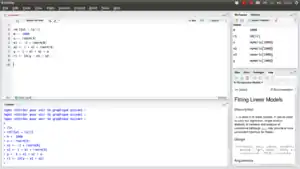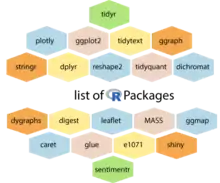RStudio
RStudio is an integrated development environment (IDE) for R, a programming language for statistical computing and graphics. It is available in two formats: RStudio Desktop is a regular desktop application while RStudio Server runs on a remote server and allows accessing RStudio using a web browser.
 | |
 RStudio on Ubuntu 12.10 | |
| Developer(s) | RStudio, PBC |
|---|---|
| Initial release | 28 February 2011[1] |
| Stable release | 1.3.959[2]
/ 18 May 2020 |
| Repository | |
| Written in | Java, C++, JavaScript[3] |
| Operating system | Ubuntu, Fedora, Red Hat Linux, openSUSE, macOS, Windows NT |
| Platform | IA-32, x86-64; Qt |
| License | Affero General Public License v3[4] |
| Website | www |
Licensing model
The RStudio IDE is available with the GNU Affero General Public License version 3. The AGPL v3 is an open source license that guarantees the freedom to share the code.
RStudio Desktop and RStudio Server are both available in free and fee-based (commercial) editions. OS support depends on the format/edition of the IDE. Prepackaged distributions of RStudio Desktop are available for Windows, macOS, and Linux. RStudio Server and Server Pro run on Debian, Ubuntu, Red Hat Linux, CentOS, openSUSE and SLES.[5]
Overview and History
The RStudio IDE is partly written in the C++ programming language and uses the Qt framework for its graphical user interface.[6] The bigger percentage of the code is written in Java. JavaScript is also amongst the languages used.[7]
Work on the RStudio IDE started around December 2010,[8] and the first public beta version (v0.92) was officially announced in February 2011.[1] Version 1.0 was released on 1 November 2016.[9] Version 1.1 was released on 9 October 2017.[10]
In April 2018, RStudio PBC (at the time RStudio, Inc.) announced that it will provide operational and infrastructure support to Ursa Labs[11] in support of the Labs focus on building a new data science runtime powered by Apache Arrow.[12]
In April 2019, RStudio PBC (at the time RStudio, Inc.) released a new product, the RStudio Job Launcher. The Job Launcher is an adjunct to RStudio Server.[13] The launcher provides the ability to start processes within various batch processing systems (e.g. Slurm) and container orchestration platforms (e.g. Kubernetes). This function is only available in RStudio Server Pro (fee-based application).
Packages
In addition to the RStudio IDE, RStudio PBC and its employees develop, maintain, and promote a number of R packages.[14] These include:

- Tidyverse – R packages for data science, including ggplot2, dplyr, tidyr, and purrr
- Shiny – An interactive web technology
- RMarkdown – Markdown documents make it easy for users to mix text with code of different languages, most commonly R (programming language). However, the platform supports mixing R with Python (programming language), shell scripts, SQL, Stan (software), JavaScript, CSS, Julia (programming language), C (programming language), Fortran, and other languages in the same RMarkdown document.[15]
- flexdashboard - publish a group of related data visualizations as a dashboard
- TensorFlow - open-source software library for Machine Intelligence. The R interface to TensorFlow lets you work productively using the high-level Keras and Estimator APIs and the core TensorFlow API
- Tidymodels - install and load tidyverse packages related to modeling and analysis
- Sparklyr - provides bindings to Spark’s distributed machine learning library. Together with sparklyr’s dplyr interface, you can easily create and tune machine learning workflows on Spark, orchestrated entirely within R
- Stringr - consistent, simple and easy-to-use set of wrappers around the 'stringi' package
- Reticulate - provides a comprehensive set of tools for interoperability between Python and R.
- Plumber - enables you to convert your existing R code into web APIs by merely adding a couple of special comments.
- knitr – Dynamic reports combining R, TeX, Markdown & HTML
- packrat – Package dependency tool
- devtools – Package development tool as well as helps to install R-packages from GitHub.
- sf – supports for simple features, a standardized way to encode spatial vector data. Binds to 'GDAL' for reading and writing data, to 'GEOS' for geometrical operations, and to 'PROJ' for projection conversions and datum transformations.[16]
Addins
The RStudio IDE provides a mechanism for executing R functions interactively from within the IDE through the Addins menu.[17] This enables packages to include Graphical User Interfaces (GUIs) for increased accessibility. Popular packages that use this feature include:
- bookdown – a knitr extension to create books
- colourpicker – a graphical tool to pick colours for plots
- datasets.load – a graphical tool to search and load datasets
- googleAuthR – Authenticate with Google APIs
Development
The RStudio IDE is developed by RStudio, PBC, a commercial enterprise founded by JJ Allaire,[18] creator of the programming language ColdFusion. RStudio, PBC has no formal connection to the R Foundation, a not-for-profit organization located in Vienna, Austria,[19] which is responsible for overseeing development of the R environment for statistical computing.
References
- "RStudio, new open-source IDE for R | RStudio Blog". Blog.rstudio.org. Retrieved 2015-05-01.
- "Release 1.3.959". 18 May 2020. Retrieved 23 May 2020.
- "rstudio/rstudio". GitHub. RStudio. Retrieved 18 December 2016.
- Pylvainen, Ian (2016-03-24). "What license is RStudio available under? – RStudio". rstudio.com. Retrieved 2018-05-25.
- "RStudio". rstudio.com. Retrieved 2 December 2016.
- Verzani, John (23 September 2011). Getting Started with RStudio. O'Reilly Media, Inc. p. 4. ISBN 9781449309039.
- "rstudio/rstudio". GitHub. Retrieved 2018-09-13.
- "portable download of java dependencies · rstudio/rstudio@484cb88 · GitHub". Github.com. 2010-12-07. Retrieved 2015-05-01.
- "Announcing RStudio v1.0!". RStudio Blog. 1 November 2016.
- "RStudio v1.1 Released". RStudio Blog. 9 October 2017.
- "About Ursa Labs". Retrieved 2019-08-13.
- Allaire, JJ. "Arrow and beyond: Collaborating on next generation tools for open source data science". RStudio. Retrieved 13 May 2018.
- "RStudio 1.2 Release".
- "Inspired by R and its community". RStudio. Retrieved 13 May 2018.
- Yihui Xie; Joseph J. Allaire; Garrett Grolemund (2019), R Markdown: The Definitive Guide, Chapman & Hall, Wikidata Q76441281.
- Pebesma, Edzer (2018). "Simple Features for R: Standardized Support for Spatial Vector Data". The R Journal. 10: 439–446. doi:10.32614/RJ-2018-009.
- "RStudio Addins". RStudio. Retrieved 2018-09-16.
- "Why Rstudio?". Rstudio.com. Retrieved 2015-12-15.
- ""Statutes of "The R Foundation for Statistical Computing""" (PDF). The R Foundation. Retrieved 2019-08-12.
